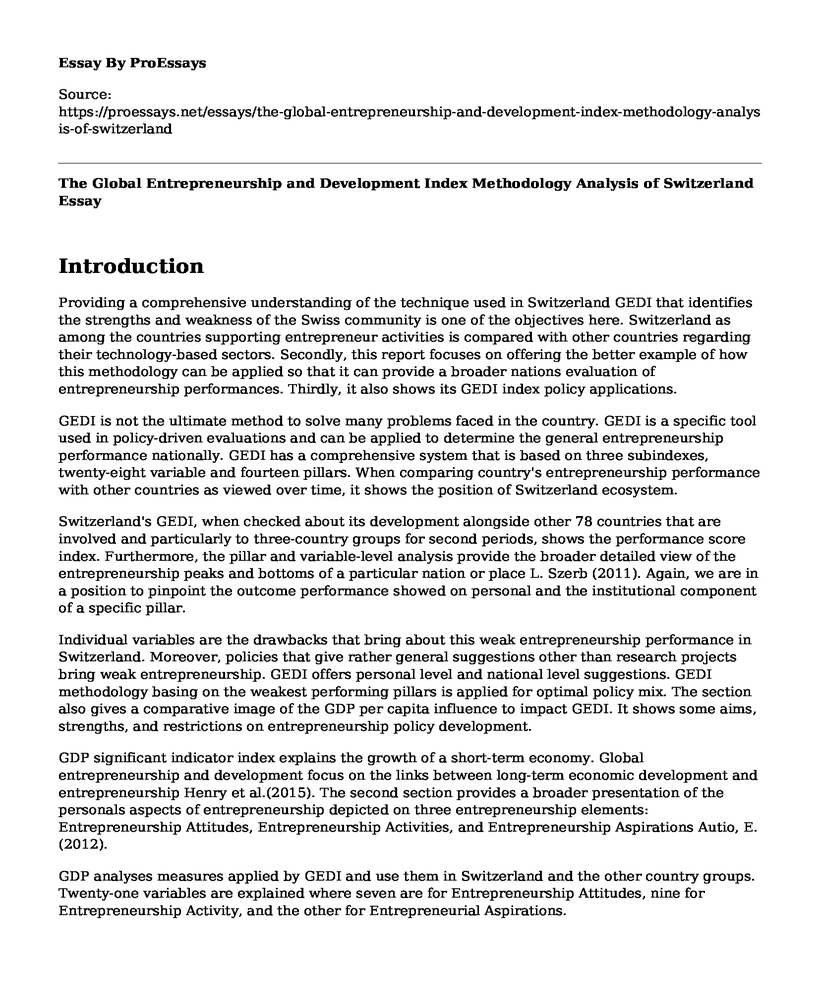Introduction
Providing a comprehensive understanding of the technique used in Switzerland GEDI that identifies the strengths and weakness of the Swiss community is one of the objectives here. Switzerland as among the countries supporting entrepreneur activities is compared with other countries regarding their technology-based sectors. Secondly, this report focuses on offering the better example of how this methodology can be applied so that it can provide a broader nations evaluation of entrepreneurship performances. Thirdly, it also shows its GEDI index policy applications.
GEDI is not the ultimate method to solve many problems faced in the country. GEDI is a specific tool used in policy-driven evaluations and can be applied to determine the general entrepreneurship performance nationally. GEDI has a comprehensive system that is based on three subindexes, twenty-eight variable and fourteen pillars. When comparing country's entrepreneurship performance with other countries as viewed over time, it shows the position of Switzerland ecosystem.
Switzerland's GEDI, when checked about its development alongside other 78 countries that are involved and particularly to three-country groups for second periods, shows the performance score index. Furthermore, the pillar and variable-level analysis provide the broader detailed view of the entrepreneurship peaks and bottoms of a particular nation or place L. Szerb (2011). Again, we are in a position to pinpoint the outcome performance showed on personal and the institutional component of a specific pillar.
Individual variables are the drawbacks that bring about this weak entrepreneurship performance in Switzerland. Moreover, policies that give rather general suggestions other than research projects bring weak entrepreneurship. GEDI offers personal level and national level suggestions. GEDI methodology basing on the weakest performing pillars is applied for optimal policy mix. The section also gives a comparative image of the GDP per capita influence to impact GEDI. It shows some aims, strengths, and restrictions on entrepreneurship policy development.
GDP significant indicator index explains the growth of a short-term economy. Global entrepreneurship and development focus on the links between long-term economic development and entrepreneurship Henry et al.(2015). The second section provides a broader presentation of the personals aspects of entrepreneurship depicted on three entrepreneurship elements: Entrepreneurship Attitudes, Entrepreneurship Activities, and Entrepreneurship Aspirations Autio, E. (2012).
GDP analyses measures applied by GEDI and use them in Switzerland and the other country groups. Twenty-one variables are explained where seven are for Entrepreneurship Attitudes, nine for Entrepreneurship Activity, and the other for Entrepreneurial Aspirations.
Conclusion
Finally, the last Section focuses on providing specific policy recommendation for Switzerland. These suggested policies based on the analysis of the personal and institutional variables presented in the second and third section. The GEI is used as a measure to indicate the extent to which entrepreneurship is supportive Anon.,2012 and Trott, et al.,2015). GEI analyses entrepreneurial activities by 14 key pillars and each nation ranked by its GEI. This attributes measures focuses on what can be done to improve entrepreneurial skills. The better performing areas are in competition, tech sector and risk capital (OECD,2012). GEDI index value will be increased by providing an optimal policy that incorporates advancement to ensure that the worst performing pillars are in a position to reach a 0.1 index value. This way it will boost the country's weak culture, poor networking and will improve the entrepreneurship ecosystem further.
References
Acs, Z. J. and A. Varga (2005), `Entrepreneurship, agglomeration and technological change'. Small Business Economics 24(3), 323{334.)
Acs, Z. J. and L. Szerb (2011), The Global Entrepreneurship and Development Index 2011. Cheltenham, UK: Edward Elgar.
Amoros, J.,Bosma N. &Levie, J.,2013. Ten years of global entrepreneurship monitor: Accomplishments and prospects.International Journal of Entrepreneurial Venturing. 5(2) pp.120-152.
Cite this page
The Global Entrepreneurship and Development Index Methodology Analysis of Switzerland. (2022, May 22). Retrieved from https://proessays.net/essays/the-global-entrepreneurship-and-development-index-methodology-analysis-of-switzerland
If you are the original author of this essay and no longer wish to have it published on the ProEssays website, please click below to request its removal:
- The Business Relationship Between China and Hong Kong
- The Historical and Cultural Meaning of Hospitality - Paper Example
- What Is Disruptive Innovation? Essay Example
- How USA Does Business With Other Countries Essay Example
- Accounting Fraud at WolrdCom Case Study Paper Example
- Essay Sample on Entrepreneurship: Design, Launch, Profit
- Successful MBEs and Accessing Capital for Growth and Sustainability - Essay Sample







